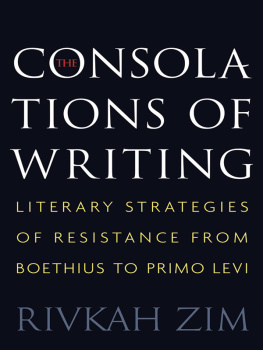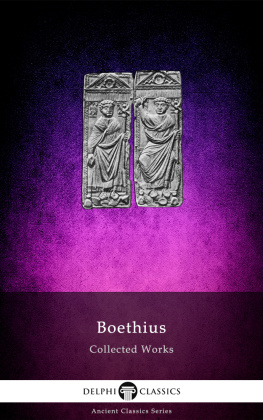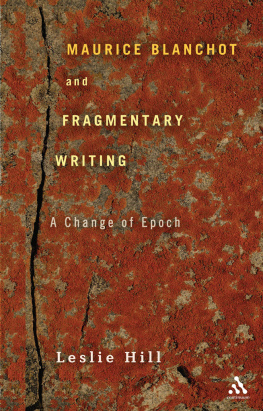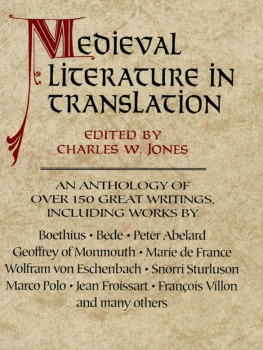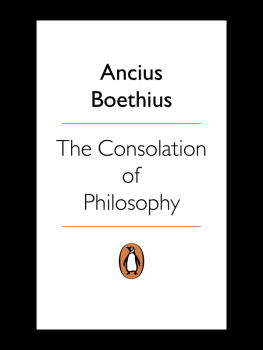
THE CONSOLATIONS OF WRITING
THE CONSOLATIONS OF WRITING
LITERARY STRATEGIES OF RESISTANCE FROM BOETHIUS TO PRIMO LEVI
RIVKAH ZIM
PRINCETON UNIVERSITY PRESS PRINCETON AND OXFORD
Copyright 2014 by Princeton University Press
Published by Princeton University Press, 41 William Street, Princeton, New Jersey 08540
In the United Kingdom: Princeton University Press, 6 Oxford Street, Woodstock, Oxfordshire OX20 1TW
press.princeton.edu
Excerpts from The Diary Of Anne Frank (Critical Edition) by Anne Frank, copyright 1986 and 2001 by Anne Frank-Fonds, Basel/Switzerland, for all texts of Anne Frank. English translation copyright 1989 and 2003 by Doubleday, a division of Random House LLC, New York and by Penguin Books, Ltd, London. Used by permission of Doubleday, an imprint of the Knopf Doubleday Publishing Group, a division of Random House LLC. All rights reserved. Any third party use of this material, outside of this publication, is prohibited. Interested parties must apply directly to Random House LLC for permission
Excerpts from Tales from The Secret Annexe translated by Ralph Manheim and Michael Mok
(Penguin, 1988). Originally published in Dutch as Verhaaltjes en Gebeurtenissen uit het Achterhuis beschreven door Anne Frank.
Copyright 1949, 1960, by Otto Frank
Copyright 1982 by Anne Frank-Fonds, Basel.
This translation first published in the USA by Doubleday & Company, Inc. 1983.
Published in Great Britain by Viking 1985.
Published in Penguin Books 1986. Reprinted in 1986 (twice), 1988.
English translation copyright 1952, 1959 by Otto H. Frank.
English translation 1983 by Doubleday & Company Inc.
Portions of this work were previously published in Tales from the House Behind
(The Worlds Work (1913) Ltd, 1962; Pan Books Ltd, 1965).
The original manuscripts are in the Anne Frank House in Amsterdam and in the Institute for War Documentation in Amsterdam.
Excerpts from 33 Sonnets of the Resistance and Other Poems by Jean Cassou (Arc, 2004) translated by Timothy Ads. English language translation Timothy Ads, 2004.
Trente-trois sonnets composs au secret, by Jean Cassou Editions Gallimard, Paris, 1995.
Excerpts from Grey is the Colour of Hope by Irina Ratushinskaya, Copyright 1989 by Seahorse Inc.
Reproduced by permission of Hodder and Stoughton Limited.
Excerpts from Collected Poems by Primo Levi (Faber, 1988). English translation copyright 1988 by Ruth Feldman and B. Swann.
All Rights Reserved
Library of Congress Cataloging-in-Publication Data
Zim, Rivkah.
The consolations of writing : literary strategies of resistance from Boethius to
Primo Levi / Rivkah Zim.
pages cm
Includes bibliographical references and index.
ISBN 978-0-691-16180-8 (hardcover : alk. paper) 1. Politics and literature. 2. Underground literatureHistory and criticism. 3. Protest literatureHistory and criticism. 4. Prisoners writingsHistory and criticism. 5. Autobiography. 6. Politics in literature. 7. Psychic trauma in literature. I. Title.
PN51.Z485 2014
809.93353dc23 2013039659
British Library Cataloging-in-Publication Data is available
This book has been composed in Garamond Pro and Ideal Sans
Printed on acid-free paper
Printed in the United States of America
1 3 5 7 9 10 8 6 4 2
FOR BENJAMIN AND TAMAR
JONATHAN AND DANIELLA
DANIEL AND ABIGAIL
AND
IN MEMORY OF MALCOLM PARKES
La nuit trouve enfin la clart
Thophile de Viau
CONTENTS
ACKNOWLEDGMENTS
This book has been growing, slowly, first at Pembroke College, Cambridge, and, since 1991, at Kings College London, from seeds that germinated in of my first book, on sixteenth-century English metrical psalms. It is a great pleasure to acknowledge the many debts of gratitude to friends, colleagues, and postgraduate students that I have gladly incurred there, as elsewhere. Generous friendships that nurture the life of the mind have been most inspiring; among these I have been especially blessed by the encouragement, patient wisdom, and support of Christine Rees and David Ricks at Kings, Jonathan Steinberg in Cambridge (long ago), and (always) the late Malcolm Parkes of Keble College, Oxford. As my work neared completion, Pamela Robinson, Alastair Minnis, Michael Questier, and John Stokes heroically, and most generously, gave me their scholarly advice and support by reading drafts of part or all of this book, which has been invaluable. I thank them all most warmly. The late Stephen Wall and the late Paul Korshin each made contributions to the development of my ideas in the mid-1990s, and since 2003 different cohorts of MA students at Kings and colleagues at the Institute of Historical Research have helped me to clarify my ideas about writing in captivity. Students and colleagues at Victoria College of the University of Toronto, Boston College, the University of Minnesota, St. Scolasticas College, St. Olafs College, the University of Pennsylvania, and Ohio-Wesleyan University kindly invited me to share early versions of some chapters as papers in progress during the 1990s and provided a warm reception in all weathers. I am also indebted to Norma Rinsler, Harry Guest, and Philip Kuhn for providing access to translations of Cassous sonnets. I greatly appreciate all their efforts and contributions and hope that they may now take some pleasure from the completed work.
The dedication is jointly to my nephews and nieces with my love and great hopes for the future, and to the memory of Malcolm Parkes who died shortly after this book was completed but without whom it would never have been attempted or finished. Malcolms friendship, generosity, outstanding scholarly example, and unfailing personal support over nearly forty years mean more than I can say.
THE CONSOLATIONS OF WRITING
Introduction
You become a dissident when you first cross the line from doublethink and fear, and begin to say openly what you believe. The transition from hiding your thoughts to speaking them is a moment of tremendous relief and liberation. For the first time you achieve an inner freedom in which there is no discord between what you think, say and do. As the pressure from the regime grows, you come to understand how terrified it is of your independence and how desperate it is to recapture the space you have conquered from ityour own mind. In prison however, you realize most clearly a basic truth of life: that people do not want any life by any means, but rather a life of freedom, even if it is obtained at great personal cost. This is true of individuals, societies and nations. Paradoxically, it is in prison, behind bars and concrete walls, that one gains a level of moral clarity and simplicity that is impossible to achieve in almost any other situation.
Natan Sharansky, The Times, Friday, 10 December 2010, p. 37
For centuries the experiences of European intellectuals in prisons of various kinds stimulated them to reconsider aspects of the human condition in their responses to personal crises, and Europes turbulent history of wars, persecution, and revolution. While these writers circumstances and contemporary attitudes to prisoners have varied greatly, similar forms, themes, and functions tend to recur in their prison writing. The structure of this book, juxtaposing different pairs of writers across national and period boundaries, from late antiquity to the late twentieth century, gives form to this aspect of its argument. Yet, while individuals have reacted to pain, loneliness, fear, and violence in similar ways, the external history of penal practice and state-organized mass persecution has changed the ethics, politics, and reception of prison writing. This is particularly owing to the unprecedented industrial scale of murder and slave labor in twentieth-century prison camps, the impact of totalitarianism, mass communication, and a wider appreciation of human rights based on religious ethics and ideals of
Next page
